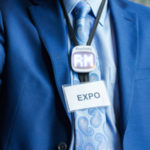They’re best for networking. They’re where the relationships form that make the work work. There’s something about looking a person in the eye (no, not via Google Hangouts) that cannot be duplicated via email. (Read Barbara Palmer’s blog post from July 2011 about a people-based approach to virtual meetings.)
But sometimes it’s the simplest of things that again remind us that people do, in fact, value face-to-face interaction. On my flight from PCMA’s annual holiday luncheon in Chicago last week, I sat next to a young woman. She was very courteous — and visibly anxious. Having been a nervous flier (and, let’s be honest, I still am on occasion), I chalked it up to flying anxiety. I’m not one to try to force too much conversation on a flight, especially a longer one (I was flying back to my hometown of Portland, Ore.). It can be difficult to extract yourself after a bit of polite chatter and you then run the risk of having to hear about someone’s seven rescue cats for the duration of your time in the air. But I did get to chatting with her, asking whether she was from Seattle, my connection city. She was actually from Indiana, and was flying out to Seattle to meet her boyfriend. For the first time in person. They had met via a random Facebook connection and stayed in touch for a number of years. Back in September, they started officially dating, communicating mostly via Skype.
We’ve all heard stories of people who meet their mates online — and online dating sites have exploded in the past several years. But what I found most interesting was her explanation of why she thought the relationship had worked thus far, and why it was good for them to not yet have met each other in person. She explained how it had been nice to get to know each other without the pressure of face-to-face time. She said she thought it had made their relationship stronger than if they had just started dating in person. And while she was very nervous to finally see him in the flesh (and see whether the relationship that stood up over bandwidth was really as engaging in its live form), I barely got out a “Goodbye — hope you have a wonderful time!” as she sped off the plane once we landed.
Many relationships in the meetings industry start via email, over the phone, and often via Twitter. We communicate with one another, find out with whom we have some rapport, and even start to figure out those we might consider “friends” if and when we meet in person. PCMA’s upcoming Convening Leaders annual meeting is a good example. I’ve been browsing through our LinkedIn community discussions and have seen a number of first-time attendees reaching out about what to expect January 13-16 in Orlando. Veterans are offering tips, and people — old and new — are making plans to meet up once they arrive and navigate the meeting. In fact, PCMA’s headquarters has implemented a program for “newbies” to pair up with the Convening Leaders “die hards” to show them the ropes of the meeting. Naturally, great new connections will be made and new attendees will feel less overwhelmed and able to experience all that Convening Leaders has to offer (and it’s a lot! Check out the full schedule). It will be my first time attending the meeting as well, so I can understand some of the brewing trepidation.
Because, in the end, isn’t it the excitement of that face-to-face interaction that really drives us? Whether we’re introverted or extroverted, there’s something thrilling about connecting with someone in person whom you’ve only communicated electronically. I can’t tell you how many people to whom I’ve enthused “I can’t wait to meet you finally in Orlando!” over the past several months. And while first-time face-to-face meetings of any magnitude can be overwhelming, they are undeniably exciting — and necessary.



